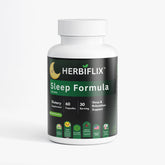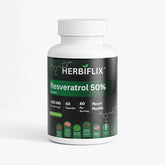Berberine and Your Medications: Essential Interactions You Need to Know
Berberine, a natural isoquinoline alkaloid extracted from various plants like goldenseal, Oregon grape, and barberry, has garnered significant attention in the health and wellness community. Revered for its potential in supporting healthy blood sugar support, cardiovascular function, and overall metabolic health, Berberine is becoming a staple for many seeking natural health optimization. However, its potent biological activity also means it can interact with various medications. Understanding these interactions is not just important; it's essential for your safety and the effectiveness of your treatment plans.
As experts in health supplements, we at Herbiflix advocate for informed decision-making. While Berberine offers compelling benefits, particularly for managing aspects of metabolic health, it's crucial to approach its use with a full understanding of its potential drug interactions. This guide will illuminate the science behind these interactions, empowering you to discuss your supplement choices confidently with your healthcare provider.
Understanding Berberine's Mechanism of Action
Berberine's therapeutic effects are vast and complex, often attributed to its ability to activate adenosine monophosphate-activated protein kinase (AMPK), an enzyme that plays a central role in cellular energy homeostasis. This activation can lead to improved insulin sensitivity, reduced glucose production in the liver, and enhanced glucose uptake by cells. Beyond AMPK, Berberine also influences gut microbiota, anti-inflammatory pathways, and lipid metabolism.
It's precisely this broad spectrum of activity that makes Berberine so effective, yet also necessitates caution when combined with pharmaceutical drugs. Its influence on various physiological systems can either amplify, diminish, or alter the metabolism of certain medications.
The Science of Drug Interactions: CYP450 and P-glycoprotein
One of the primary ways Berberine can interact with medications is through its impact on crucial enzyme systems in the liver and intestines responsible for drug metabolism and transport. The two main players here are:
- Cytochrome P450 (CYP450) Enzymes: This family of enzymes is central to drug metabolism. They break down approximately 70-80% of all drugs, preparing them for excretion. Berberine has been shown to inhibit several CYP450 enzymes, particularly CYP2D6, CYP2C9, and CYP3A4. When Berberine inhibits these enzymes, it can slow down the breakdown of drugs metabolized by them, potentially leading to higher levels of the medication in your bloodstream and an increased risk of side effects or toxicity.
- P-glycoprotein (P-gp): This is a major drug efflux pump found in the gut, liver, kidneys, and blood-brain barrier. P-gp acts like a cellular bouncer, pushing drugs and toxins out of cells. Berberine can inhibit P-gp, meaning it might increase the absorption and reduce the excretion of drugs that are substrates for P-gp, again leading to higher systemic drug concentrations.
Key Medication Categories and Potential Interactions with Berberine
Given its influence on CYP450 enzymes and P-gp, Berberine can interact with a wide array of medications. Here are some of the most significant categories to be aware of:
1. Blood Sugar Lowering Medications
Berberine itself is a potent agent for blood sugar support. When taken with prescription diabetes medications (e.g., insulin, metformin, sulfonylureas), there's a risk of additive effects, potentially leading to hypoglycemia ( dangerously low blood sugar). Symptoms of hypoglycemia include dizziness, sweating, confusion, and rapid heart rate.
2. Blood Thinners (Anticoagulants and Antiplatelets)
Berberine may have mild antiplatelet effects. Combining it with blood thinners like warfarin (Coumadin), clopidogrel (Plavix), aspirin, or other NSAIDs could theoretically increase the risk of bleeding or bruising. Close monitoring of INR (International Normalized Ratio) is vital for those on warfarin.
3. Blood Pressure Medications
Some research suggests Berberine can help lower blood pressure. Taking it alongside antihypertensive drugs (e.g., ACE inhibitors, beta-blockers, calcium channel blockers) could lead to an excessive drop in blood pressure, causing dizziness or fainting.
4. Immunosuppressants (e.g., Cyclosporine)
Cyclosporine, an immunosuppressant often used in transplant patients, is primarily metabolized by CYP3A4 and is a P-gp substrate. Berberine's inhibition of these systems can significantly increase cyclosporine levels, leading to increased toxicity and kidney damage.
5. Sedatives and Antidepressants
Many sedatives (e.g., benzodiazepines) and certain antidepressants are metabolized by CYP450 enzymes. Berberine could potentially increase their concentrations, leading to enhanced sedative effects or increased side effects of antidepressants.
6. Statins (Cholesterol-Lowering Drugs)
Statins like atorvastatin and simvastatin are metabolized by CYP3A4. Berberine's inhibition of this enzyme could increase statin levels, potentially leading to a higher risk of muscle pain (myopathy) or liver damage.
Essential Recommendations for Safe Berberine Use
At Herbiflix, we believe in empowering our customers with knowledge. If you're considering incorporating a berberine supplement into your regimen, particularly our premium Herbiflix Berberine HCL 1200mg, and you are currently on any medications, it is absolutely paramount to:
- Consult Your Healthcare Provider: This is the most crucial step. Always inform your doctor, pharmacist, or other healthcare professional about all supplements you are taking or considering, especially Berberine. They can assess potential interactions based on your individual health profile and current medications.
- Do Not Self-Adjust Medications: Never alter the dosage of your prescribed medications without explicit guidance from your doctor.
- Monitor Your Symptoms: Be vigilant for any unusual symptoms, side effects, or changes in how you feel when combining Berberine with medications. Report these immediately to your healthcare provider.
- Understand Your Medications: Know what enzymes metabolize your drugs and if they are P-gp substrates. This information can help you have a more informed discussion with your doctor.
- Choose Quality Supplements: Ensure you are using a high-quality, pure berberine supplement from a reputable brand like Herbiflix, which offers transparency in its sourcing and manufacturing.
Conclusion
Berberine is a powerful natural compound with a growing body of scientific evidence supporting its role in metabolic health and blood sugar support. Its benefits are undeniable, but so is its potential to interact with pharmaceutical medications. By understanding the mechanisms of these interactions and prioritizing open communication with your healthcare team, you can harness the benefits of Berberine safely and effectively. Your health journey is unique, and informed choices are your most powerful tool.





